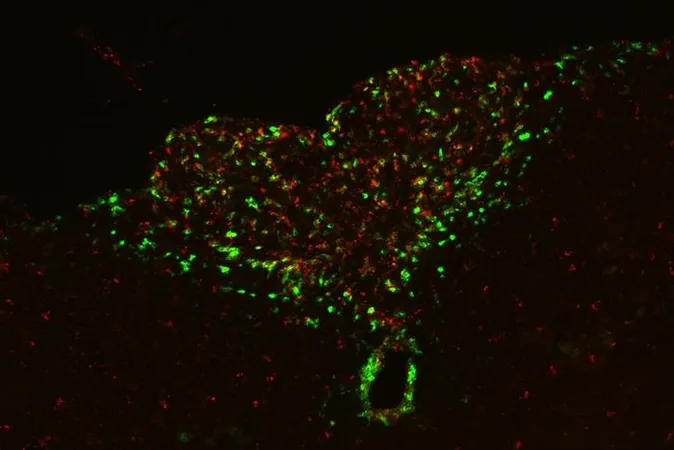
Unlocking the Mystery of Apathy in Cancer Patients: A Brain-Immune Connection
2025-04-11
Author: Rajesh
The Profound Impact of Cancer Beyond the Body
Cancer isn't just a physical battle; it takes a heavy psychological toll as well. Patients, even those known for their resilience, often find themselves grappling with emotional challenges that worsen their overall well-being. New groundbreaking research uncovers that this emotional downturn may not solely stem from psychological factors but also from a biological chain reaction caused by cancer cachexia, a debilitating wasting syndrome often seen in advanced cancer cases.
New Insights from Science: Understanding Apathy
In an eye-opening study published in *Science*, researchers from Cold Spring Harbor Laboratory and Washington University School of Medicine have detailed a brain-immune system circuit responsible for the apathy linked to cancer cachexia. Their findings indicate inflammation disrupts brain signaling and dampens dopamine levels, which are crucial for motivation and the sensation of reward.
A Deeper Look into Cancer Cachexia
Cachexia is characterized by severe weight loss, muscle and fat depletion, and energy imbalance. Previously, its ties to chronic inflammation and metabolic changes were known, but this study dives into how these factors contribute to behavioral symptoms, specifically the pervasive apathy many patients experience.
Mouse Models Reveal Critical Connections
In their quest to unveil the connection between apathy and immune responses, scientists examined mouse models of cancer cachexia and observed shifts in immune activity and neurotransmitter dynamics. They pinpointed a brainstem region that acts as a sensor for inflammation, specifically responding to interleukin-6 (IL-6). High levels of IL-6 in neurons trigger signals that inhibit dopamine release, effectively sapping the mice's motivation to engage in basic actions.
Reversing Apathy: A Beacon of Hope
The team didn't stop there; they explored whether altering this neural circuit could mitigate these symptoms. Reducing IL-6 signaling in the brain revived the mice's motivation, making them more eager to seek food. Likewise, increasing dopamine levels achieved similar improvements. While motivation surged, the symptoms of cancer and weight loss continued—a promising indication that cachexia-related apathy might be treated independently from the cancer itself.
A Promising Path Forward for Patients
This discovery opens new doors for treatment. Existing antibody therapies targeting IL-6, currently used for other inflammatory conditions, could be repurposed to alleviate motivational deficits in cancer patients, potentially enhancing their mental state and overall response to treatment. "It’s remarkable that motivation was restored even in late-stage disease," noted Dr. Marco Pignatelli, highlighting the potential to significantly improve patients' quality of life.
Beyond Cancer: A Broader Implication
The implications of this research extend beyond cancer; similar brain-immune mechanisms may contribute to fatigue and emotional decline across other chronic illnesses marked by systemic inflammation. As research leaders aim to refine treatments, they're committed to enhancing the lives of patients, making them better equipped to engage with anti-cancer therapies.
A Paradigm Shift in Understanding Apathy
This research not only reshapes our understanding of apathy in advanced cancer but underscores that it's not just an emotional fallout from physical decline—it's a direct response to inflammation within the brain. This opens the door to innovative treatments that target these biological pathways, potentially improving motivation and quality of life, even when traditional cancer treatments are no longer viable.




 Brasil (PT)
Brasil (PT)
 Canada (EN)
Canada (EN)
 Chile (ES)
Chile (ES)
 Česko (CS)
Česko (CS)
 대한민국 (KO)
대한민국 (KO)
 España (ES)
España (ES)
 France (FR)
France (FR)
 Hong Kong (EN)
Hong Kong (EN)
 Italia (IT)
Italia (IT)
 日本 (JA)
日本 (JA)
 Magyarország (HU)
Magyarország (HU)
 Norge (NO)
Norge (NO)
 Polska (PL)
Polska (PL)
 Schweiz (DE)
Schweiz (DE)
 Singapore (EN)
Singapore (EN)
 Sverige (SV)
Sverige (SV)
 Suomi (FI)
Suomi (FI)
 Türkiye (TR)
Türkiye (TR)
 الإمارات العربية المتحدة (AR)
الإمارات العربية المتحدة (AR)